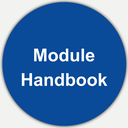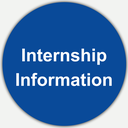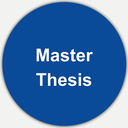Curriculum
The MEG study programme is designed as a two-year (4 semesters), full-time programme (120 ECTS). It aims at:
Realizing - The development of a sound knowledge base of the most pressing environmental issues facing the planet and their underlying societal causes;
Understanding - The reflection on human-environment interactions from a wide spectrum of disciplines, approaches, and world-views;
Managing - The provision of methodological knowledge and skills for the context-sensitive design and management of environmental governance processes.
Learning
An important feature of the modularised course system is that the students play an active role at all levels, including teaching and research. The course system does not only convey specialised knowledge, but also trains students to handle scientific methods with confidence. Key qualifications are supported through a number of techniques, such as discussions, presentations, working groups and written assignments.
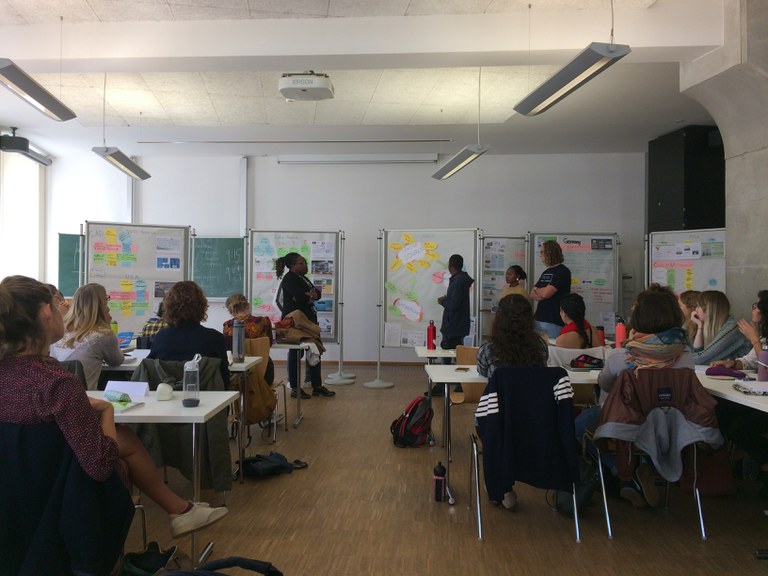
The structure and content of each module are flexible; in most cases courses are organised by more than one lecturer. The number of participants in each course is limited to ensure small effective student groups.
A range of elective modules enables students to personalise their learning experience and ensure that they are tailoring their knowledge and skills towards the specialisations they are most interested in for their future careers. A sample of the possible elective offerings in the MEG program are shown below, while students can also pursue related electives (approved by the faculty) from other departments in the university or through affiliated programs such as AGEP, EUCOR, and EPICUR.
Students can also choose to replace up to two elective modules with a Current Topic Paper.
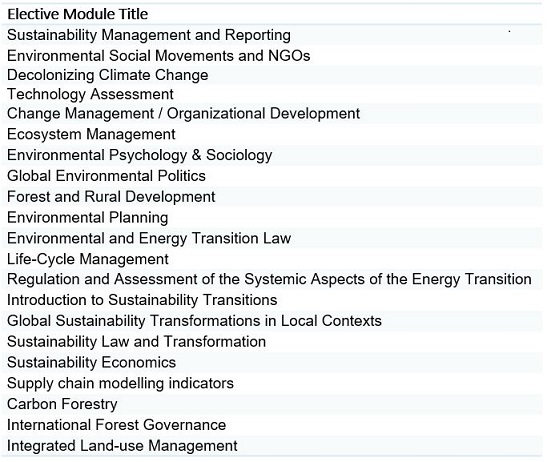
Curriculum Highlights
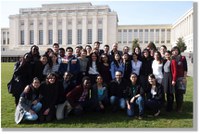 As a highlight of the curriculum, MEG students have the outstanding opportunity to visit prestigious organisations in Frankfurt to get a glimpse of the overall framework as well as the working environment in these institutions. These excursions include visits to the Deutsche Gesellschaft für Internationale Zusammenarbeit (GIZ) GmbH and Kreditanstalt für Wiederaufbau (KfW).
As a highlight of the curriculum, MEG students have the outstanding opportunity to visit prestigious organisations in Frankfurt to get a glimpse of the overall framework as well as the working environment in these institutions. These excursions include visits to the Deutsche Gesellschaft für Internationale Zusammenarbeit (GIZ) GmbH and Kreditanstalt für Wiederaufbau (KfW).
We also host an annual online expert speaker series from UN and other International Organizations to hear various perspectives on challenges towards sustainable development from such experts as at the United Nations Environment Programme (UNEP), United Nations Development Programme (UNDP), World Food Programme (WFP), International Labor Organization (ILO), UN Partnership for Action On Green Economy, Green Economy Coalition, World Business Council on Sustainable Development, various conventions such as CITIES and BRS, International Union for the Conservation of Nature (IUCN), and World Wildlife Fund (WWF). Other courses include day excursions and invite local stakeholders and experts from NGOs and other international entities to give their critical perspectives.
Extracurricular Event
Team Skill Weekend
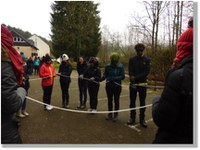 Each MEG generation is provided with a Team Skill Workhshop, which takes place towards the end of the 1st semester, shortly before the Christmas. Together with the trainers the group stays overnight in a wonderfully located and very comfortable seminar house near Freiburg.
Each MEG generation is provided with a Team Skill Workhshop, which takes place towards the end of the 1st semester, shortly before the Christmas. Together with the trainers the group stays overnight in a wonderfully located and very comfortable seminar house near Freiburg.
Click here to find out more.
Orientation Week
During the mandatory Orientation Week (one week prior to the start of lectures) students get to know the MEG team and their MEG fellow students, will be introduced to the programme, have a workshop about communication in an international group, a workshop about studying in MEG and Germany and get very important information about administrative and organisational aspects of your studies.


